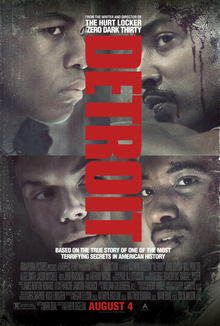Set during the Summer of 1967, Detroit
focuses on a small, but infamous, event that took place during the 1967 Detroit
riots. The event in question occurred at the Algiers motel
where shots fired from a starting pistol were met with a heavy handed, and racially
motivated, police response. We follow several characters, including musician Larry
Reed (Aglee Smith), racist police officer Philip Krauss (Will Poulter) and onlooker security guard
Melvin Dismukes (John Boyega), on this fateful night.
With all that’s been happening in
recent years regarding racial tensions across America it is easy to sit through Detroit thinking that nothing has
changed. Clearly with recent events providing a mirror image of the events depicted
in Detroit make it uncomfortable
viewing for anyone who thinks the dark days of 60s America are a long way in
the past. Granted black people (and any other minority) are not discriminated
against to the extent they have different seating areas in restaurants and buses
but systematic racism (particularly within the police force) remains a very
real and thorny issue.
This is obviously not Kathryn Bigelow’s
first attempt at tackling a major political discussion point in modern America.
The Hurt Locker took on the Iraq War and Zero: Dark Thirty threw itself into
the torture and abuse of human rights debate (Bigelow was ludicrously compared to
Leni Riefenstahl and the film was considered, by people who didn’t pay
attention and are incapable of separating the writer and the character, to be
pro-torture). Similar accusations were thrown at Detroit for containing
pornographic violence, but surely to label the violence 'pornographic' you yourself had to
turned on by it?
Detroit is quite a long film
(clocking in at 140 odd minutes) and becomes quite an ordeal to sit through as the
suffering the cops subjected their suspects to takes up a good hour of runtime, making the film incredible draining. This is how the filmmaker intended, the blows felt
by the majority black suspects feel painful, they look real and the film's raw
style of documentary filmmaking (the film was shot by Greengrass regular
Barry Ackroyd) makes the violence feel realistic but in no way gratuitous and
pornographic.
The film meanders somewhat as it
tries to introduce to the cast of characters who would have their life forever changed
from this night on. The time spent with the characters is vital because it gets
you engaged with the characters thus making their ordeal all the more arduous. Will Poulter
does a stunning job as the film’s main antagonist, and acting as one the film’s
main victims is Aglee Smith’s Larry Reed who shows strong signs of PTSD following
the traumatic event.
The end result is all too
depressing at its been repeated through the latter half of 20th
Century American history and beyond. That, coupled with the fact that the world
still faces similar problems, makes Detroit an infuriating but worthy watch.
4/5




I liked this film, I thought it was well done but it still had a lot of flaws, the pacing and the stories not gelling together being the biggest one.
ReplyDeleteI've still never seen Zero Dark Thirty.